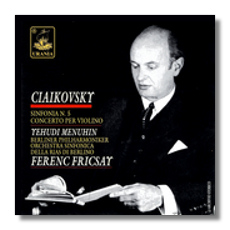
The Internet's Premier Classical Music Source
Related Links
- Tchaikovsky Reviews
- Latest Reviews
- More Reviews
-
By Composer
-
Collections
DVD & Blu-ray
Books
Concert Reviews
Articles/Interviews
Software
Audio
Search Amazon
Recommended Links
Site News
 CD Review
CD Review
Piotr Ilyitch Tchaikovsky

- Symphony #5 in E minor, Op. 64 (1888)
- Concerto in D Major for Violin, Op. 35 (1878) 1
Yehudi Menuhin, violin
Berlin Philharmonic Orchestra/Ferenc Fricsay
1 RIAS Symphony Orchestra of Berlin/Ferenc Fricsay
Urania URN 22.130 ADD monaural 73:12
One of Hungarian conductor Ferenc Fricsay's first Deutsche Grammophon recordings was of Tchaikovsky's Fifth Symphony. It was taped in 1949, and it continued to be available for many years into the LP era. The budget Heliodor label, for example, released it in electronic stereo, and this LP still turns up in used record stores with regularity. Collectors sought the LP out for Fricsay's impassioned conducting, and 51 years later it continues to pack a punch.
Urania, an Italian label, has prepared this release from magnetic tapes, not from the original 78rpm discs. As a result, surface noise is non-existent, although there are some noticeable splices. The sound is remarkably full; the only drawback is that there is some distortion at climaxes, but it didn't bother me too much. It's a small price to pay for a reading that generates so much passion with so little exaggeration. Fricsay shows himself to be an outstanding colorist, and the Berlin Philharmonic seems to hang on every flick on his baton. For an example of what this reading does, try the opening of the third movement and note the different string tones that Fricsay and the Berlin Philharmonic produce. Very few recordings have such sensitivity to color without crossing the border into fussiness.
The Violin Concerto also comes from 1949, but this is a live performance (applause is edited out, however) not originally intended for commercial release. (It first appeared on a Longanesi Periodici LP.) Moments of unlucky intonation aside, Menuhin was in red-hot form for this performance, which emphasizes the score's sweeping grandeur. Fricsay doesn't step on his soloist's personality, and yet the performance bears his concern for balancing the letter of the score with its spirit. Having said that, I note that Menuhin and Fricsay play an abridged version of the third movement, and the effect is a little brutal. The sound here is not quite as good as on the commercial recording, but it's still very friendly to performers.
It is good to hear these old friends on CD.
Copyright © 2000, Raymond Tuttle




















